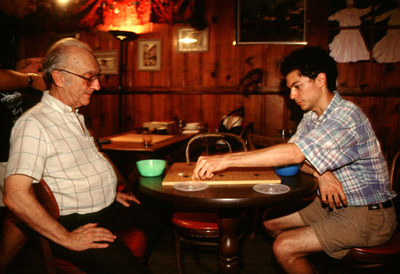Joe Schoenfield was a professor of mathematics in the field of logic who spent most of his career teaching at Duke University. He was very successful in his field, publishing many papers and an authoritative text on logic that is still used, was for a time head of the math dept. at Duke, and was prominent in international societies.
But meanwhile . . . he liked to play games. He was an excellent bridge player, a fierce poker player, so good at checkers (draughts, damas) that he complained he could find no competition, and somewhere he had learned Go. We are not sure where he learned it - he spent some time around 1950 at the Institute for Advanced Studies at Princeton and we know there were people there who played (John Nash for instance), but another story has him learning it from a graduate student soon after he arrived at Duke.
In the mid '60's Dick Scoville came to Duke as an assistant professor in the math dept. in the field of Topology. He had learned the game somehow at Yale, spent a year in Japan and learned a little more, and spent the next thirty years playing Joe every day at noon in the math lunch room. (Now, you might think that very bright people playing that much would become very strong, but they only reached one to two kyu. I think it is an example of the limits to improvement set by a trial and error approach. During much of that time there were few books available in English translation, no internet, and only occasionally would a strong player come to this area).
But to continue the tale, Dick Scoville had a graduate student named John Goodrich who had learned the basics of the game as an undergraduate at the Univ. of Vermont. I had learned a little of it in Calif. and began playing with John, who introduced me to Dick and Joe. And so on. A very few of us would play on Tuesday nights at one another's houses for many years, and then when we became a few more, we would find coffee shops or restaurants that would let us play. Now we are pretty well established, 22 players last Wed. night from 4d down to absolute beginners.
 But Joe was unique. The first thing you noticed was that he was a very serious and determined player; always there, the first to arrive and the last to put his stones away. And the second thing you noticed was that he was very fussy and particular, even rude. It drove him mad when his opponent would take a stone out of their bowl and hover over the board. "Oops! Oops!" he would say. Or he would take a stone out of his bowl and hover over the board also. He had other odd habits. In difficult positions he would fidget round, almost climb over the back of his chair. If he got your group in trouble and started chasing it into the center he would hum happily as he played. When Joe started humming you knew you had problems.
But Joe was unique. The first thing you noticed was that he was a very serious and determined player; always there, the first to arrive and the last to put his stones away. And the second thing you noticed was that he was very fussy and particular, even rude. It drove him mad when his opponent would take a stone out of their bowl and hover over the board. "Oops! Oops!" he would say. Or he would take a stone out of his bowl and hover over the board also. He had other odd habits. In difficult positions he would fidget round, almost climb over the back of his chair. If he got your group in trouble and started chasing it into the center he would hum happily as he played. When Joe started humming you knew you had problems.
One year he obtained Ishida's Dictionary of Joseki and then we were in trouble. He would learn complicated variations of the taisha and play them on people again and again. Then it was the low pincer to the high approach to the 3 4 pt. or six months of the avalanche joseki. I got headaches.
Most of us learned a lot from Joe. If he insisted on being odd and peculiar we learned to be patient with it. He was like that, but he would play with anyone and play with passion whether he gave nine stones or took some. We miss him.